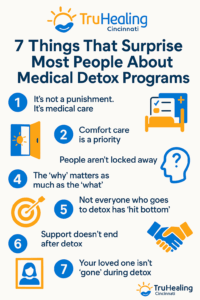It’s easy to imagine detox as something dramatic—cold sweats, locked doors, round-the-clock distress. But when my brother first went through a medical detox program, what surprised me most was how different it was from what we’d expected.
If you’re starting to wonder whether someone you love (or even yourself) might benefit from real support in the earliest days of sobriety, this might help reshape the picture.
1. It’s not a punishment. It’s medical care.
Many people assume detox is something people are forced into, like being grounded or sent away. But a true medical detox program is nothing like that. It’s healthcare—just like going to the hospital for chest pain or a broken bone. Detox is about stabilizing the body, protecting the mind, and making it possible to move toward healing.
At TruHealing Cincinnati, this care happens under the guidance of trained medical professionals who understand the physical and emotional challenges of withdrawal. They aren’t there to judge. They’re there to help.
2. Comfort care is a priority.
You might picture detox as a miserable experience—but in a medically supported program, comfort matters. That doesn’t mean it’s easy, but it’s not the trauma-filled ordeal you may have seen in movies.
Medications can help ease symptoms like nausea, tremors, or anxiety. Staff check in frequently. Rooms are designed to be calming and safe. And when someone is struggling, they aren’t left alone.
The goal is to make detox as tolerable and safe as possible—because healing shouldn’t have to start in fear.
3. People aren’t locked away.
One of the biggest myths? That detox means isolation.
In reality, medical detox programs prioritize both safety and dignity. While safety measures are in place (like removing access to harmful items), the goal isn’t to shut people off from the world. Many programs allow phone calls to loved ones, regular check-ins with staff, and quiet time for reflection.
Some even integrate light therapy, mindfulness sessions, or peer support where appropriate. Detox is structured—but it isn’t prison.
4. The “why” matters as much as the “what.”
While the focus of detox is to clear substances from the body, the deeper purpose is to start the healing process. That includes gently exploring why someone has been using—without forcing immediate answers.
Many people enter detox unsure of their next steps. That’s okay. At TruHealing Cincinnati, the team meets clients where they are. Emotional safety and curiosity are just as important as physical stability.
Early insights from detox can shape what kind of care or support will help most after discharge. Whether that’s residential treatment, outpatient therapy, or another path entirely, detox sets the stage.
5. Not everyone who goes to detox has “hit bottom.”
You don’t have to be in crisis to seek detox. In fact, many people come because they don’t want to wait until things fall apart.
Whether it’s the realization that alcohol is taking more than it’s giving, or concern about dependence on prescription meds, choosing detox early can be a form of prevention. It’s a step toward clarity—not a last resort.
And that shift matters. Because when detox is framed as care instead of consequence, people are more likely to seek it before they’re in danger.
6. Support doesn’t end after detox.
One common fear? That detox is a brief bubble of safety, and then you’re on your own. That’s not how it works—at least not with a program like TruHealing Cincinnati.
Detox is the first step in a continuum of care. Afterward, staff work with each person to map out what comes next. That might include:
- Residential treatment for structured healing
- Partial hospitalization programs (PHP) for intensive daytime support
- Intensive outpatient programs (IOP) with more flexibility
- Therapy, peer groups, or medical support in the community
Detox is a doorway, not a destination.

7. Your loved one isn’t “gone” during detox.
If you’re a family member, this one’s important. Detox can feel like a disappearance—especially if your loved one is quiet, withdrawn, or going through physical symptoms that make connection hard.
But they’re still them. And often, you’ll begin to see glimpses of the person beneath the substance use. A clearer voice. A softer look in their eyes. A moment of humor or honesty.
Healing starts slow. But it starts.
FAQ: What People Ask About Medical Detox
Is medical detox the same as going to rehab?
Not exactly. Detox is the first phase—focused on withdrawal and physical safety. Rehab or treatment programs come afterward, and they work on emotional healing, mental health, and long-term recovery skills.
How long does detox usually take?
It varies based on the substance and the person. Some detoxes are complete in 3–7 days. Others may take 10 days or more, especially if there are complicating factors like co-occurring conditions.
What happens if someone doesn’t want to go to detox?
Consent is key. While families can encourage and support, medical detox works best when the individual is ready to engage—even if they’re unsure about everything else.
Can detox be done at home?
Sometimes, but it’s not recommended for most substances. Detoxing from alcohol, opioids, or benzodiazepines can be dangerous without medical support. A professional program monitors vital signs and can intervene if things become risky.
What if I’m not sure it’s time yet?
You don’t have to be sure to reach out. Exploring options doesn’t commit you to anything. At TruHealing Cincinnati, the team welcomes questions and helps you make informed choices.
🌱 Wondering if medical detox might be the right next step?
Whether you’re exploring this for someone you love or for yourself, we’re here to talk it through—not pressure you into anything.
📞 Call TruHealing Cincinnati or learn more about our medical detox program in Cincinnati.
You’re not alone in wondering. And you don’t have to navigate this stage without support.


